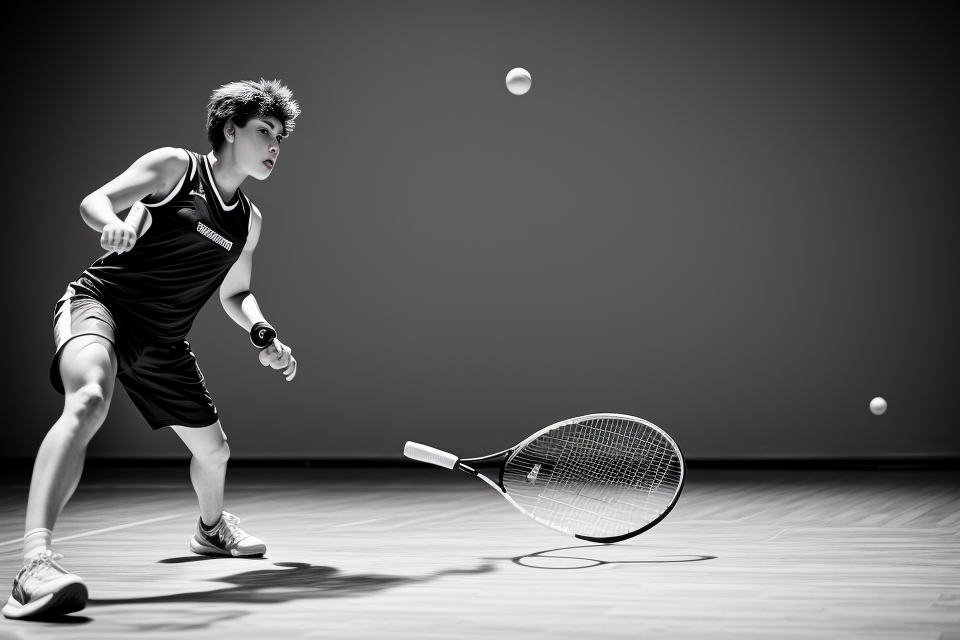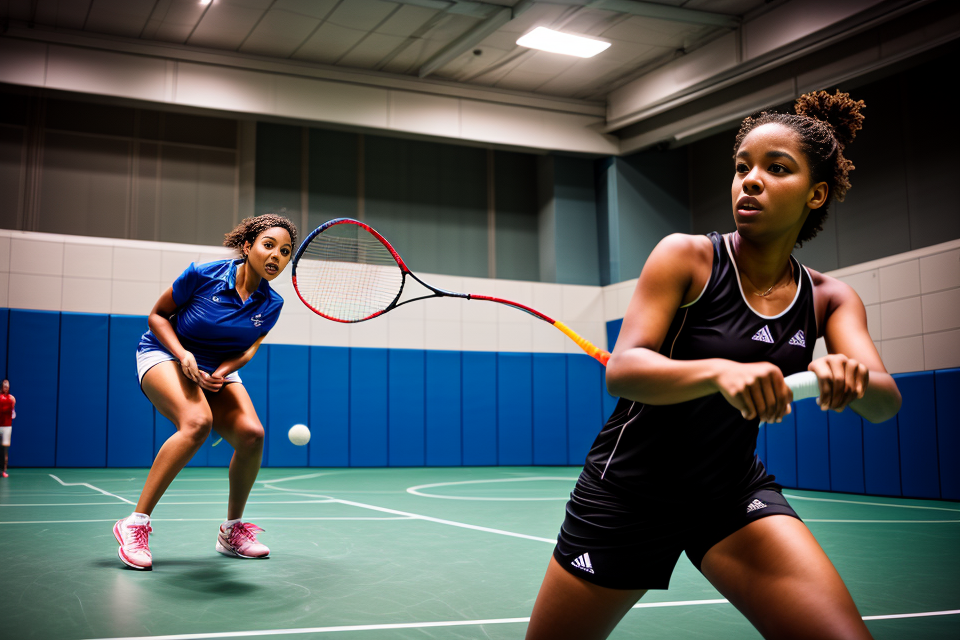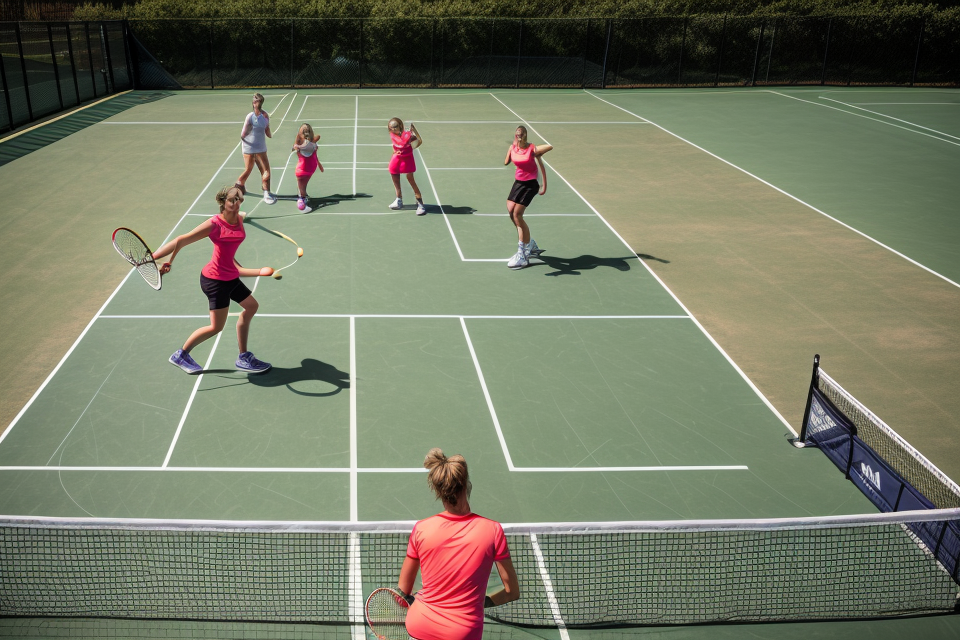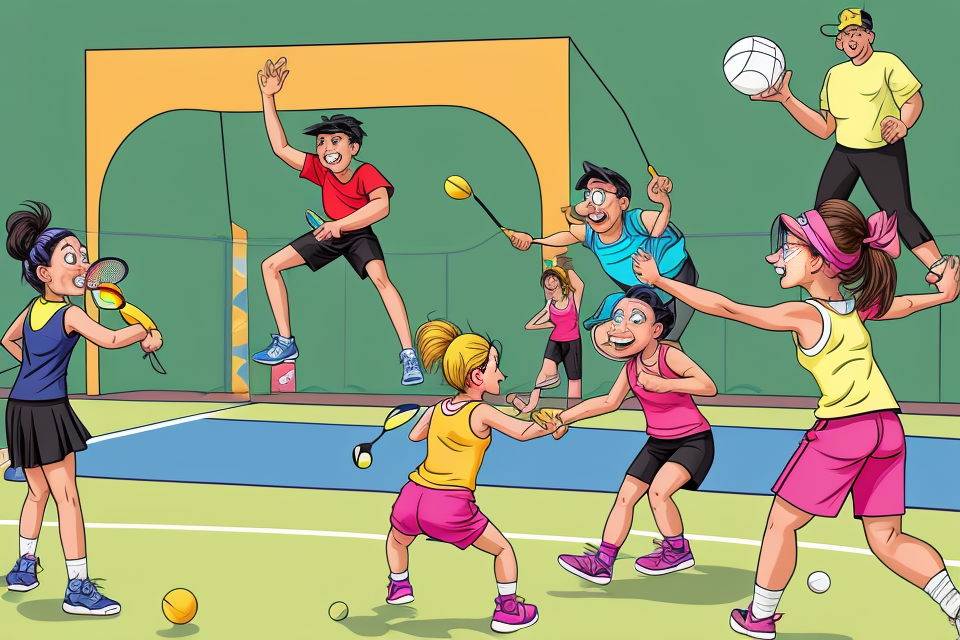Are you looking to improve your squash skills and become a pro at the game? Look no further! This article is packed with expert tips and advice on how to enhance your squash game, no matter your skill level. From mastering the basic techniques to developing your strategic thinking, we’ve got you covered. So, get ready to take your squash game to the next level with these practical tips and tricks.
Setting Realistic Goals
Identifying areas for improvement
- Assessing your current level of skill
- The first step in identifying areas for improvement is to assess your current level of skill. This can be done by observing yourself during a match or practicing session, and asking a coach or more experienced player for feedback. It is important to be honest with yourself about your strengths and weaknesses, as this will help you set realistic goals and focus your efforts in the right areas.
- Understanding your strengths and weaknesses
- Once you have a clear understanding of your current level of skill, it is important to identify your strengths and weaknesses. This will help you prioritize which areas to focus on in order to improve your overall game. For example, if you have a strong backhand but struggle with your forehand, it may be more beneficial to spend more time practicing your forehand than your backhand.
- Setting specific, measurable goals
- Setting specific, measurable goals is key to improving your squash skills. Instead of setting vague goals such as “improve your game,” set specific goals such as “increase your speed on the court” or “hit more accurate serves.” This will help you stay focused and motivated, and allow you to track your progress over time. Additionally, it is important to set realistic goals that are achievable within a reasonable timeframe. This will help prevent frustration and burnout, and keep you motivated to continue improving.
Setting achievable goals
- One of the keys to improving your squash skills is setting achievable goals. This means breaking down larger goals into smaller, manageable steps that you can work towards gradually.
- By focusing on one aspect of the game at a time, you can concentrate on improving that specific skill and avoid feeling overwhelmed by the entire game. For example, if you want to improve your serves, focus on practicing your toss and follow-through, rather than trying to improve your entire serve game all at once.
- It’s also important to avoid the temptation to compare yourself to others. Remember that everyone has their own strengths and weaknesses, and it’s important to focus on your own progress rather than trying to match someone else’s level of skill.
Developing a Training Plan
Building endurance and stamina
As a beginner in squash, building endurance and stamina is crucial to improving your game. Here are some tips to help you develop these essential skills:
Incorporating cardio exercises into your routine
Incorporating cardio exercises into your routine is an effective way to build endurance and stamina. Some examples of cardio exercises that can be beneficial for squash players include running, cycling, and swimming. These exercises can help improve your cardiovascular health, which is essential for playing squash at a high level. It is recommended to incorporate these exercises into your routine at least three times a week, with each session lasting between 30-60 minutes.
Practicing drills that focus on movement and footwork
Practicing drills that focus on movement and footwork is another effective way to build endurance and stamina. These drills can help improve your ability to move quickly and efficiently around the court, which is essential for playing squash at a high level. Some examples of drills that can help improve your movement and footwork include ladder drills, shuffle drills, and agility cones drills. It is recommended to practice these drills for at least 15-20 minutes, three times a week.
Gradually increasing the intensity and duration of your workouts
Gradually increasing the intensity and duration of your workouts is essential for building endurance and stamina. It is important to start slowly and gradually increase the intensity and duration of your workouts over time. This will help prevent injury and ensure that your body has time to adapt to the increased demands of your training. It is recommended to start with shorter workouts and gradually increase the duration over time, while also gradually increasing the intensity of your workouts.
By incorporating these tips into your training plan, you can help improve your endurance and stamina on the squash court. Remember to start slowly and gradually increase the intensity and duration of your workouts over time to avoid injury and ensure that your body has time to adapt to the increased demands of your training.
Improving technique and form
One of the key elements of becoming a skilled squash player is improving your technique and form. This involves developing proper movements and techniques that will help you to perform at your best on the court. Here are some tips to help you improve your technique and form:
Observing and mimicking the movements of more experienced players
One of the best ways to improve your technique and form is to observe and mimic the movements of more experienced players. Watching experienced players play can give you a good idea of what proper technique looks like, and you can use this as a guide to improve your own movements.
When observing experienced players, pay attention to their grip, stance, footwork, and other key elements of their technique. Try to mimic their movements as closely as possible, focusing on maintaining proper form and control.
Practicing basic skills such as grip, stance, and footwork
Another important aspect of improving your technique and form is practicing basic skills such as grip, stance, and footwork. These skills form the foundation of your game and are essential for performing at your best on the court.
When practicing these skills, it’s important to focus on proper form and control. Make sure you are using the correct grip on your racquet, and that your stance and footwork are in the right position. Practice these skills slowly and carefully at first, and then gradually increase your speed and intensity as you become more comfortable.
Focusing on proper breathing and relaxation techniques
Proper breathing and relaxation techniques are also important for improving your technique and form. When you’re playing squash, it’s easy to get caught up in the action and forget to breathe properly. However, proper breathing can help you to stay focused and calm, and can also help to prevent injury.
Try to focus on your breathing during the game, taking deep breaths and exhaling slowly to help you relax. You can also try relaxation techniques such as visualization and meditation to help you stay focused and calm on the court.
By focusing on these tips, you can improve your technique and form on the squash court, and become a more skilled and confident player.
Incorporating drills and exercises
Drills and exercises are an essential component of any training plan for squash beginners. By incorporating them into your routine, you can improve your skills and prepare for gameplay. Here are some tips on how to effectively incorporate drills and exercises into your training plan:
- Use cones, balls, and other equipment to practice specific skills: Cones and balls are great tools to help you practice specific skills such as volleys, drives, and drops. You can set up different drills using these equipment to work on your weaknesses and improve your overall game.
- Practice alone or with a partner: Practicing alone can help you focus on your own skills and technique, while practicing with a partner can help you develop your teamwork and communication skills. You can switch between solo and partner practice to keep your routine interesting and challenging.
- Vary your routine to avoid boredom and stagnation: Doing the same exercises and drills every day can get boring and lead to stagnation. To avoid this, it’s important to vary your routine and try new exercises and drills. You can also mix in game-like scenarios to help you prepare for real-game situations.
Improving Mental Game
Understanding the mental aspects of squash
- Recognizing the importance of focus and concentration
- Squash is a fast-paced sport that requires split-second decision making and reactions.
- Players must be able to focus on the ball, their opponent, and their own movements while maintaining concentration throughout the game.
- Developing the ability to stay focused and concentrated for the duration of the game is crucial for success.
- Understanding the role of mental toughness and resilience
- Mental toughness refers to the ability to maintain focus, determination, and a positive attitude in the face of adversity.
- Resilience is the ability to bounce back from setbacks and stay motivated despite challenges.
- Both mental toughness and resilience are essential for squash players as they face challenges and setbacks during games.
- Developing strategies for managing stress and anxiety
- Squash can be a high-pressure sport, and players may experience stress and anxiety before and during games.
- Developing strategies for managing these emotions can help players perform at their best.
- Some strategies include visualization, deep breathing, and positive self-talk.
Developing mental toughness
Developing mental toughness is crucial for improving your squash skills. Mental toughness is the ability to remain focused, confident, and composed, even in the face of adversity. Here are some tips for developing mental toughness in squash:
Visualizing success and positive outcomes
Visualization is a powerful tool for improving your mental game. Spend time visualizing yourself performing well on the court, winning points, and playing with confidence. By visualizing success, you can build positive expectations and beliefs about your abilities, which can help you perform better on the court.
Focusing on the process rather than the outcome
It’s easy to get caught up in the outcome of a game or match, but focusing on the process can help you stay focused and calm under pressure. Instead of worrying about winning or losing, focus on the actions you need to take to play your best. This might include staying focused on the ball, maintaining good posture, and keeping a positive attitude.
Staying positive and confident even in the face of adversity
Squash can be a challenging sport, and it’s normal to experience setbacks and frustrations. However, staying positive and confident can help you overcome adversity and perform at your best. Try to maintain a positive attitude, even when things aren’t going well. Avoid negative self-talk, and instead, focus on your strengths and what you can do to improve. Remember that every match is an opportunity to learn and grow, and that setbacks are a natural part of the learning process.
Building resilience
As a beginner in squash, it is essential to develop resilience to overcome challenges and setbacks. Building resilience involves learning from mistakes and failures, recognizing and challenging negative self-talk, and staying motivated and committed to your goals.
- Learning from mistakes and failures: Making mistakes and experiencing failures are inevitable when learning a new sport like squash. Instead of dwelling on these setbacks, use them as opportunities to learn and improve. Analyze what went wrong, and think about how you can prevent similar mistakes from happening again in the future. This approach will help you build resilience and become more confident on the court.
- Recognizing and challenging negative self-talk: Negative self-talk can be a significant obstacle to improving your squash skills. It can make you feel anxious, discouraged, and unmotivated. To overcome this challenge, it is crucial to recognize when you are engaging in negative self-talk and challenge those thoughts. Ask yourself if they are based on facts or assumptions, and try to reframe them in a positive light. For example, instead of thinking, “I’ll never be able to hit that shot,” try to think, “I’ll get there with practice and patience.”
- Staying motivated and committed to your goals: Building resilience also involves staying motivated and committed to your goals, even when things get tough. This means setting realistic goals and breaking them down into smaller, achievable steps. It also means staying positive, even when things don’t go as planned. Find ways to stay motivated, such as reminding yourself of why you started playing squash in the first place, or rewarding yourself for small accomplishments along the way.
By building resilience, you will be better equipped to handle setbacks and challenges on the court, and ultimately improve your squash skills.
Incorporating Squash into Your Life
Scheduling and prioritizing
Setting aside dedicated time for squash practice and competition
To improve your squash skills, it is essential to make time for practice and competition. Setting aside dedicated time in your schedule can help you stay focused and committed to your goals. This may involve waking up early or staying late to fit in a practice session, or setting aside specific days for matches. It is important to prioritize squash in your life, but it is also crucial to maintain a healthy balance with other aspects of your life.
Balancing squash with other aspects of your life
Balancing squash with other aspects of your life can be challenging, but it is crucial for maintaining a healthy lifestyle and avoiding burnout. It is important to have a well-rounded life outside of squash, as this can help you stay motivated and energized for your training sessions. Make sure to schedule time for other activities you enjoy, such as spending time with friends and family, pursuing hobbies, or engaging in self-care practices.
Staying committed to your goals even when faced with challenges
Improving your squash skills takes time, effort, and dedication. It is important to stay committed to your goals, even when faced with challenges or setbacks. This may involve reevaluating your goals, adjusting your training schedule, or seeking support from a coach or mentor. It is normal to encounter obstacles along the way, but staying committed to your goals can help you overcome these challenges and continue making progress towards your desired outcome.
Finding resources and support
- Seeking out a coach or mentor
- Finding a coach or mentor who has experience playing squash can be a great way to improve your skills. They can provide personalized guidance and feedback on your technique, help you develop a training regimen, and offer encouragement as you progress. Look for coaches at your local squash club or reach out to more experienced players in your community for recommendations.
- Joining a squash club or team
- Joining a squash club or team can provide a supportive community of players at a similar skill level. You can play matches with other members, receive feedback on your game, and learn from more experienced players. Additionally, many clubs offer coaching and training programs that can help you improve your skills.
- Connecting with other beginners and more experienced players for advice and encouragement
- Connecting with other beginners and more experienced players can provide valuable insight and encouragement as you progress. Reach out to more experienced players for advice on how to improve your game, and connect with other beginners to share tips and experiences. Many players are happy to offer advice and support to those just starting out in the sport.
Continuing to learn and grow
Continuing to learn and grow is a crucial aspect of improving your squash skills. As a beginner, it is important to have a solid foundation in the basics of the sport, but to truly excel, you must continue to learn and grow. Here are some ways to do just that:
Reading books and articles about squash technique and strategy
One way to continue learning about squash is by reading books and articles about the sport. There are many great resources available that can help you improve your technique and strategy on the court. These resources can provide you with insights and tips from experts in the sport, as well as detailed explanations of various aspects of the game.
For example, you may want to read books on the proper grip and stance for different shots, or strategies for playing against different types of opponents. These resources can be especially helpful when you are first starting out and trying to understand the sport.
Watching professional matches and analyzing the play of top players
Another way to continue learning about squash is by watching professional matches and analyzing the play of top players. This can be a great way to see the sport in action and learn from the best in the world. As you watch matches, pay attention to the techniques and strategies used by the pros, and try to incorporate them into your own game.
You can also try analyzing the play of top players on your own, by rewatching matches or highlights and taking notes on the techniques and strategies used by the pros. This can help you identify areas where you need to improve and give you ideas for new techniques to try on the court.
Seeking out new challenges and opportunities to improve your skills
Finally, to continue learning and growing as a squash player, it is important to seek out new challenges and opportunities to improve your skills. This could mean playing in tournaments or leagues, taking lessons from a coach, or participating in training camps or clinics. These experiences can help you learn from other players and experts in the sport, and push you to improve your skills.
In addition, seeking out new challenges can help you stay motivated and engaged in the sport. By constantly setting new goals and pushing yourself to improve, you can continue to grow and develop as a squash player.
FAQs
1. What are the key skills needed to play squash well?
The key skills needed to play squash well include physical fitness, hand-eye coordination, agility, and strategy. To improve your squash skills, it’s important to focus on developing these areas through regular practice and training.
2. How can I improve my physical fitness for squash?
To improve your physical fitness for squash, you should focus on cardiovascular exercise, strength training, and flexibility exercises. Cardiovascular exercise such as running or cycling can help improve your endurance, while strength training can help build the muscles needed for powerful shots and movement around the court. Flexibility exercises such as yoga or stretching can help improve your range of motion and reduce the risk of injury.
3. How can I improve my hand-eye coordination for squash?
To improve your hand-eye coordination for squash, you can try exercises that involve tracking moving objects with your eyes and reacting quickly with your hands. Examples include hitting a tennis ball against a wall, catching a ball thrown by a partner, or hitting a target with a racquet. You can also try drills that involve moving around the court and hitting the ball in different directions, which can help improve your coordination and reaction time.
4. How can I improve my agility and footwork in squash?
To improve your agility and footwork in squash, you should focus on drills that involve moving quickly and changing direction. Examples include shuffling drills, ladder drills, and cone drills. You can also try playing games or matches with partners, which can help you practice your movement and footwork in a real-life setting.
5. What are some effective strategies for playing squash?
Effective strategies for playing squash include maintaining proper positioning on the court, using the walls to your advantage, and varying your shots to keep your opponent off guard. It’s also important to focus on your strengths and work on improving your weaknesses, as well as paying attention to your opponent’s strengths and weaknesses. Additionally, it’s important to stay focused and mentally prepared throughout the match, and to be able to adapt to changing circumstances on the court.










